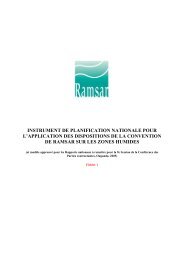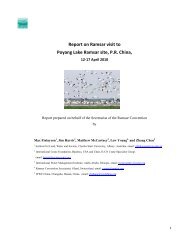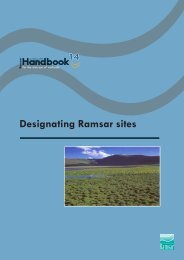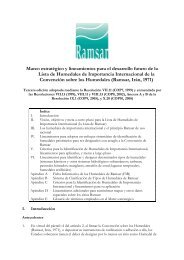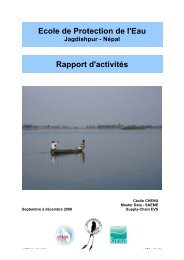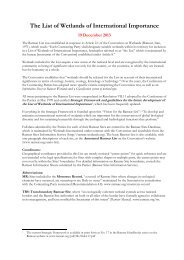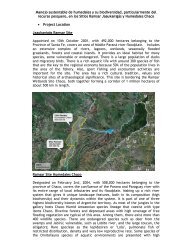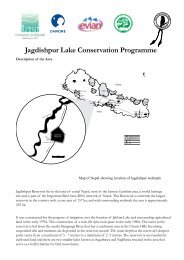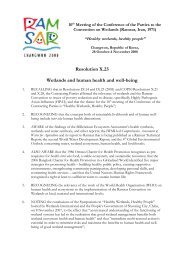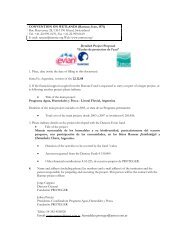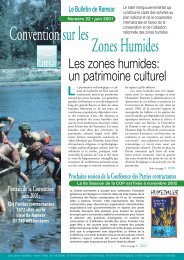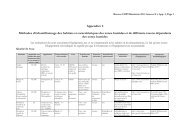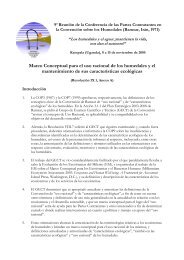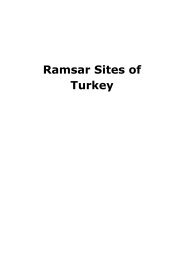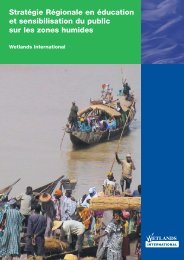Okavango Delta Management Plan - Ramsar Convention on Wetlands
Okavango Delta Management Plan - Ramsar Convention on Wetlands
Okavango Delta Management Plan - Ramsar Convention on Wetlands
Create successful ePaper yourself
Turn your PDF publications into a flip-book with our unique Google optimized e-Paper software.
3.7.2.3 Proposed criteria for future priority setting<br />
One of the guiding principles of the ODMP is that the plan should be dynamic and<br />
adaptive to address emerging issues during implementati<strong>on</strong> or recommendati<strong>on</strong>s<br />
from studies undertaken during its development phase. In order to guide future<br />
priority setting of issues, the recommended criteria, in order of importance is given<br />
in Table 3-4.<br />
Table 3-4: Criteria for future priority setting<br />
Priority Criteria Notes<br />
I Survival of the <str<strong>on</strong>g>Delta</str<strong>on</strong>g> with collaborative (inter- This relates to an issue critical to the survival of the <str<strong>on</strong>g>Delta</str<strong>on</strong>g> being<br />
sectoral) approach<br />
addressed by more than <strong>on</strong>e sector.<br />
II Livelihoods improvement with collaborative This relates to issues targeting ec<strong>on</strong>omic upliftment of people in<br />
approach<br />
the <str<strong>on</strong>g>Delta</str<strong>on</strong>g><br />
III Survival of the <str<strong>on</strong>g>Delta</str<strong>on</strong>g> with sectoral approach Issue critical to the health of the <str<strong>on</strong>g>Delta</str<strong>on</strong>g> addressed by <strong>on</strong>e secto.r<br />
IV Livelihoods improvement with sectoral<br />
Generati<strong>on</strong> of immediate benefits to the targeted groups in the<br />
approach<br />
<str<strong>on</strong>g>Delta</str<strong>on</strong>g><br />
V Improvement of knowledge through inter- Encourages learning and broadens planning capacity across<br />
disciplinary approach<br />
disciplines<br />
VI Sectoral improvement of knowledge Improved efficiency <strong>on</strong> targeted sectoral programmes<br />
3.7.2.4 Proposed tool for evaluating and ranking land use optins/activities<br />
The current land use activites and opti<strong>on</strong>s in the delta have hitherto been largely<br />
compatible with the principles of wise-use and sustainability. It is recognised<br />
however that the situati<strong>on</strong> may change in the future. In order to make optimum<br />
use of the <str<strong>on</strong>g>Okavango</str<strong>on</strong>g> <str<strong>on</strong>g>Delta</str<strong>on</strong>g> and its resources there is a need to develop a<br />
mechanism to evaluate and rank these activities in a more transparent and<br />
objective manner. Table 3-5 presents a matrix to evaluate and rank future activites<br />
that should take place in the ODRS. This provides a way of analysing the impact of<br />
a particular programme/land use activitiy <strong>on</strong> the envir<strong>on</strong>ment, social issues and<br />
ec<strong>on</strong>omic returns of such an activity. This tool should be used in c<strong>on</strong>juncti<strong>on</strong> with<br />
the criteria outlined in secti<strong>on</strong> 3.7.2.3 above.<br />
96



